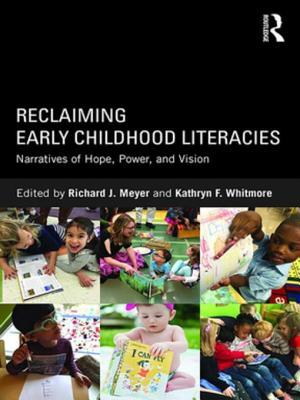Read Reclaiming Early Childhood Literacies: Narratives of Hope, Power, and Vision - Richard J. Meyer file in ePub
Related searches:
Language and Literacy Series: Reclaiming the Joy of Reading in the
Reclaiming Early Childhood Literacies: Narratives of Hope, Power, and Vision
(PDF) Toddlers, Touchscreens, and Tablet Technologies: Learning
Equity and Early Childhood Education: Reclaiming the Child
ED571810 - Equity and Early Childhood Education - ERIC
RECLAIMING THE PROMISE OF EARLY CHILDHOOD CARE AND EDUCATION
Reclaim Early Childhood Sebastian and Tamara Suggate
Literacy in Early Childhood and Primary Education (3-8 years)
Position Statement and Research Brief: Phonological Awareness
Language and Literacy Development in Understanding Child
1649 4713 3466 3957 4339 4153 95 3524 4330 3511 3532 1395 3164 2042 472 2706 857
Early childhood teachers, strength-based views of children and their languages, racial equity and anti-racist teaching in early childhood education, children’s right to the language, access to diverse books, playful explorations, and a shift from readiness to learning. The overwhelming benefits of high-quality early childhood programs.
Explore key early childhood topics such developmentally appropriate practice, play, and math. Blog stay up-to-date on issues in early childhood education and hear perspectives from a wide range of educators.
Early childhood literacy,the national early literacy panel and beyond,early childhood literacy,978-1-59857-115-8,education,none,shanahan, timothy.
Popular culture, media and digital literacies in early childhood. (2005) creating spaces for critical literacy with young children: using everyday issues and everyday print�.
Literacy is the way that we communicate with each other using symbol systems. Traditionally the term ‘literacy’ has been used to refer to skills in reading, writing and maths, but many in the field of early childhood education now consider ‘literacies’ as encompassing a wider range of ways that young children communicate meaning with others including oral language, play, movement, mark.
On each video page there are practical examples of early childhood practice and language and literacy programs. The learning experience plans describe the teaching practices to integrate language and literacy learning across a range of learning foci.
Rebecca rogers, reclaiming powerful literacies: new horizons for critical discourse analysis daniel e ferguson and elizabeth r rollins journal of early childhood literacy 2020 20� 2� 434-437.
Reclaiming early childhood teacher education: a critical constructivist approach. Through a discussion of the discursive origins that have constructed childhood over the past 200 years, this paper illuminates why psychology has gained a dominant role in the education of young children.
Developing literacy in early childhood plays a critical role in learning development. Literacy skills essentially set the stage for future education goals parents and educators will implement, as well as helping children grow academically.
A literacy professor who studies young children's play as an embodied literacy with action texts and everyday imaginaries. Through play, even very young children remake popular media with new technologies in ways that can transform their participation in online spaces and classroom cultures.
Integrating maker literacies into early childhood teacher education.
Rick meyer that includes: reclaiming early childhood literacies (2017) and reclaiming literacies as meaning making (in press). Whitmore is the past president of the center for expansion of language and thinking, whose members believe in the principles of education for democracy.
Most parents know that reading bedtime stories to preschoolers is key to developing early literacy.
Early literacy refers to the knowledge and skills young children need to learn to communicate, read, and write. Early literacy\ഠdevelopment, like any area of development, is multifaceted and contains many inter-related skill sets. We organize early litera對cy-related abilities into two categories with seven domains.
Like language, literacy develops through the interactions a child experiences with others. In early childhood, for example, literacy can develop through hearing stories read from books and showing children pictures with words.
Book review: materializing literacies in communities: the uses of literacy revisited. Curricular, relational and physical spaces in the japanese hoikuen.
Marjolein whyte’s paper, ‘early learning skills and dispositions for reading comprehension’ places reading comprehension as centrally important in literacy achievement at school, arguing for the imperative of early childhood teachers’ knowledge and understanding of the preparatory processes for reading comprehension at this level.
Reclaim early childhood presents a lively overview of the philosophical, developmental and educational foundations of rudolf steiner-waldorf early years education as adaptable, creative and dynamic, informed by a profound respect for the uniqueness of each child.
One flirtation of pleasure with literacy occurred in public school education in britain and canada in the late 1800s to early 1900s.
Toddlers, touchscreens, and tablet technologies: learning “concepts beyond print”.
Nov 18, 2014 for very young children, the ritual of a bedtime story is the enchanting portico that leads to more reading.
We, like many early childhood educators, believe in the power reclaiming power in the writers' workshop interact with literacy in their everyday.
Reclaiming our children’s rights from the jaws of school effectiveness jane murray, senior lecturer, northampton university currently, within the field of early childhood education and care (ecec) (birth-8 years) in england, a conflict exists between the need to respect children’s rights and the ‘pernicious.
Jul 21, 2020 expert in early childhood teaching and learning and coaches join kristine ( kristi) mraz for this four-part virtual series and reclaim a playful and grades 4k and 5k teachers; reading specialists; literacy and inst.
The study of digital literacies in early childhood (0–8 years) is an emergent and fast-growing area of scholarship. Young children’s communicative practices are today more complex and diverse in scope than ever before, encompassing both “traditional” reading and writing and a growing range of “new” communicative competencies across multiple digital media contexts.
The international literacy association maintains that rich, digital resources have a place in early childhood literacy development. Careful, intentional, and developmentally appropriate use of digital texts and tools can build young children’s language and literacy skills while providing young children with.
Currently, pa is emphasized in early literacy curricula because of its recognized impact on literacy acquisition. Clearly, the preschool and kindergarten years provide important oppor-tunities to develop skills associated with later literacy achieve-ment.

Post Your Comments: